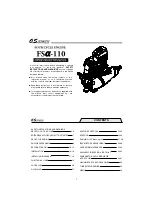
11
© Böhmer-AG 2020
AG-178FD / AG-192FD
Jump Starting
Stopping the Engine
Engine Operation
Environmental Considerations
If the battery does not have enough charge to sufficiently crank the engine, the engine can be jump-started. Use a fully charged battery (the
“jump” battery) and suitable jump-starting cables. To jump-start:
01.
Ensure the ignition is “OFF” (for some models, this is the position that allows the key to be removed).
02.
Connect the jump battery positive (“+”) terminal to the engine battery positive (“+”) terminal.
03.
Connect the jump battery negative (“-”) terminal to the engine battery negative (“-”) terminal.
04.
Follow the normal electric start procedure from step 2 onward.
Stopping in an Emergency
01.
To stop the engine immediately, turn the engine ON/OFF switch or key switch to the
“OFF” position.
Stopping in Normal Use
02.
Place the throttle control in the “SLOW” position.
03.
Place the engine ON/OFF switch or key switch in the “OFF” position.
04. Place the fuel tap in the “OFF” position.
Once the engine is running and has warmed up, adjust the engine speed as required by moving
the throttle lever (C).
For electric start models, when the engine is running, normal battery charging will occur. The
engine must run for several hours to fully charge the battery.
Altitude
If the engine is being used in altitudes at or above 1500m (approximately 5000’), adjustments to the carburettor may be required. This is because
there is less oxygen in the air as altitude increases, which effectively “enriches”
the ratio of fuel to air going into the engine and the higher the altitude, the
richer the fuel mixture becomes. If the engine is being permanently operated at
high altitude, it is recommended to have an authorized service centre make the
necessary carburettor adjustments. If the engine is used occasionally at altitude
(not extreme altitudes), no adjustments should be required, however, a slight
decrease in engine performance can be expected.
Temperature
If the engine is being used in extremely cold or hot environments; for example,
desert or snow conditions, the type of engine oil may need to be changed to suit
environmental temperatures. Oil thickens as the temperature decreases and
thins as temperature increases, which means that if the engine oil is not suited
to the temperature its ability to properly lubricate the engine may be affected. Use the chart above to determine the correct engine oil.
Engine Starting and Operation Continued
C












































